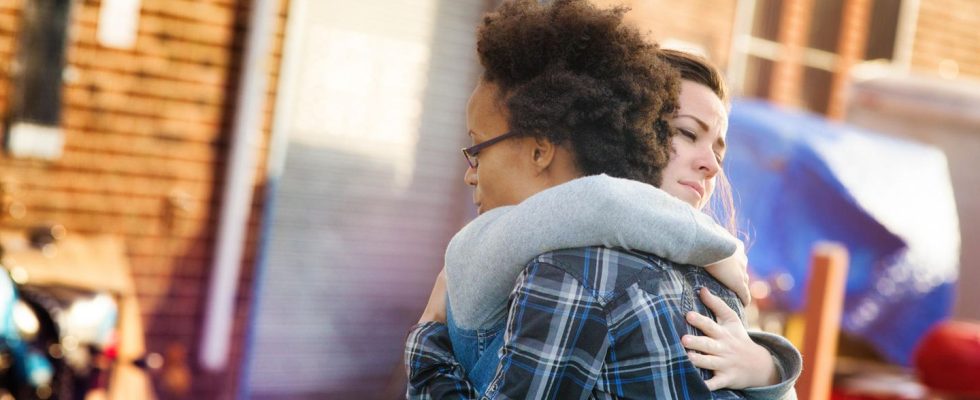Whether it’s a lie between friends, an infidelity or an unfair evaluation – there are people who forgive others more easily for their missteps. And that can have positive effects on our psyche and physical well-being.
It almost seems like the script of a drama what happened to psychologist Everett Worthington. A professor of psychology at Virginia Commonwealth University, he had been studying forgiveness for almost a decade when his mother was murdered when her home was broken into in 1996. A young man is said to have been the perpetrator, but he is never prosecuted.
“I had applied the forgiveness model many times before, but never to an event this big,” Everett Worthington told the American Psychological Association. But he was able to forgive the young man very quickly.
Fortunately, most people will not have to face a situation as extreme as Everett Worthington in their lifetime. But probably everyone knows small or larger injustices that gnaw at us. Like the teacher who laughed at you when giving your grades or your best friend who lied to you.
Forgiving your counterpart afterwards is not always easy. This ability has to be learned – and it sometimes takes years to develop it: “I had a professor at the university who gave me a B and it took me ten years to forgive him,” said Everett Worthington his early experiences with forgiveness to the American Psychological Association.
Forgiveness as Strength
Today he knows: Contrary to some opinions, forgiving people does not mean being weak. Forgiving someone has no bearing on whether justice is done, Everett Worthington said: “Forgiveness takes place in my own skin.”
Forgiving someone when they make a mistake can improve their physical health and mental well-being. Everett Worthington posits that reducing stress is the key link that connects forgiveness and physical well-being.
Forgiveness is good for body and mind
A 2020 study of female nurses aged 43 to 64 found that those who were able to forgive felt better. The researchers evaluated the data from 54,703 subjects in a nursing study that has been running in the USA since 1989. The participants are asked about their physical and psychosocial well-being every two years. The researchers examined the data to see how (spiritual) forgiveness affected that very condition.
The result: those women who forgave others had higher levels of psychosocial well-being. They also described better social integration. In addition, the forgiving participants were less likely to complain of anxiety or depression.
In a 2019 study, psychologists Yu-Rim Lee and Robert Enright reviewed 128 studies to find out how being forgiven or forgiving someone affects our physical health. The researchers looked at cholesterol, stress hormones, high blood pressure, pain and autoimmune diseases, among other things. They find that those people who are not forgiven have to reckon with health consequences. On the other hand, those who are forgiven live more calmly and healthily.
principles of happiness
How do I become (more) happy? According to science with these 14 habits
How to learn to forgive
But sometimes it’s easier for us to keep being angry. So how to forgive? The psychologist Everett Worthington puts a whole Workbook (in English) available to learn to forgive others. The method is called REACH.
R: Recall the hurt (remember the injury)
If you want to heal, you have to face the fact that you have been hurt. Those who want to forgive should not treat the other person badly and instead see them as a valuable person. So snide remarks are out of place. And you have to actively choose to forgive.
E: Empathy with your partner (Show empathy towards the other person)
You should put yourself in the other person’s shoes. Everett Worthington suggests an exercise: “Pretend the other person is sitting across from you in an empty chair. Talk to them. Open your heart. Then, when you have said everything, sit in their chair. Talk to your imaginary self in a way that helps you understand why the other person might have wronged you.” This exercise helps to put yourself in the other person’s position or at least to be able to show him sympathy and compassion. This will help to recover from the injuries.
A: Altruistic Gift (altruistic gift)
Everyone has been forgiven before and everyone then felt this liberating feeling. Those who have been forgiven do not want to disappoint the person again. Forgiveness can therefore be seen as a gift – so that the other person can also feel so light and free.
C: commit (We pledge to forgiveness)
Anyone who has forgiven should write a little note. For example: “Today I have [Name der Person] forgive him for hurting me.” This will help hold on to forgiveness.
H: Hold onto forgiveness (Hold on to forgiveness)
This is where the note from the previous step comes in: It’s not always easy to stay with forgiveness, so feelings of anger or resentment arise when the note is picked up. This reminds you that you have chosen forgiveness.
Sources: Everett Worthington, reach workbook, study 1, study 2Psynchology Today,American Psychological Association, VCU

